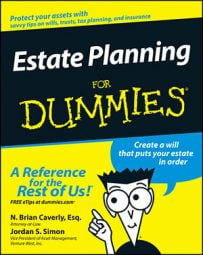Some states are repealing or phasing out their inheritance or estate taxes, but other states that currently don’t have estate-related taxes are instituting an inheritance or estate tax. Whereas most state governments had budget surpluses throughout the 1990s, the early 2000s have been quite a different story with deficits coming back as a result of economic slowdown. As a result, states are looking to all kinds of new sources of revenue to help cover shortfalls.
Pay attention to the details of any existing inheritance or estate taxes that may apply where you live, such as your state’s tax-rate structure. For example, your state may impose different inheritance tax rates on different people, depending on their relationship to you (for example, parents and children in one group or class, other relatives in a second class, unrelated people in a third class, and so on).
Depending on where you live, your state inheritance and estate tax situation will be one of these four scenarios:
No estate-related taxes at all — lucky you!
A state estate tax, which operates much the same way as the federal estate tax does. A tax is imposed on your estate’s value and is paid out of your estate (typically by your personal representative).
A state inheritance tax, which actually taxes your beneficiaries on what they receive, rather than the estate itself. Don’t forget that the primary responsibility for filing the inheritance tax return and paying the tax usually falls on the personal representative.
A pick-up or soak-up tax which means your estate doesn’t actually owe any additional money to pay that tax, even though a state estate tax return likely needs to be filed. The state gets a cut of what would otherwise be paid to the IRS (but your personal representative still probably has to file a lot of state tax paperwork anyway!)
Also, don’t forget about any exemptions your state has, such as excluding life insurance, pensions, or fixed dollar amounts for different classes of recipients. You definitely need to work with your accountant.
Even if you don’t live in a state with a state estate tax, part of your estate may still be subject to a state death tax. How? If you own property (specifically, real estate) in another state, estate or inheritance tax may apply for your out-of-state property if the state where the property is located does have death taxes. Make sure your accountant knows if you have any out-of-state property so you can factor that into your estate plan.

